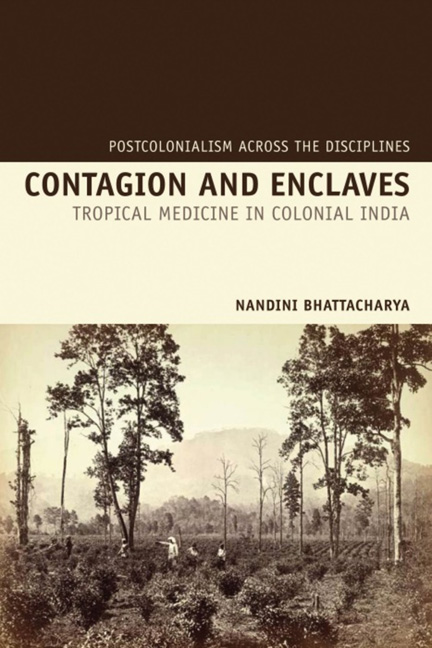Book contents
- Frontmatter
- Dedication
- Contents
- List of Illustrations
- List of Tables
- Acknowledgements
- List of Abbreviations
- 1 Disease and Colonial Enclaves
- 2 The Sanatorium of Darjeeling: European Health in a Tropical Enclave
- 3 Pioneering Years in Plantation and Medicine in Darjeeling, Terai and Duars
- 4 The Sanatorium Enclave: Climate and Class in Colonial Darjeeling
- 5 Contending Visions of Health Care in the Plantation Enclaves
- 6 The Plantation Enclave, the Colonial State and Labour Health Care
- 7 Tropical Medicine in Its ‘Field’: Malaria, Hookworm and the Rhetoric of the ‘Local’
- 8 Habitation and Health in Colonial Enclaves: The Hill-station and the Tea Plantations
- Bibliography
- Index
8 - Habitation and Health in Colonial Enclaves: The Hill-station and the Tea Plantations
- Frontmatter
- Dedication
- Contents
- List of Illustrations
- List of Tables
- Acknowledgements
- List of Abbreviations
- 1 Disease and Colonial Enclaves
- 2 The Sanatorium of Darjeeling: European Health in a Tropical Enclave
- 3 Pioneering Years in Plantation and Medicine in Darjeeling, Terai and Duars
- 4 The Sanatorium Enclave: Climate and Class in Colonial Darjeeling
- 5 Contending Visions of Health Care in the Plantation Enclaves
- 6 The Plantation Enclave, the Colonial State and Labour Health Care
- 7 Tropical Medicine in Its ‘Field’: Malaria, Hookworm and the Rhetoric of the ‘Local’
- 8 Habitation and Health in Colonial Enclaves: The Hill-station and the Tea Plantations
- Bibliography
- Index
Summary
So far we have discussed the impact of colonization and consequently medical policies in two different, contiguous enclaves: the hill-station of Darjeeling and the tea estates in its adjoining regions of northern Bengal. The town of Darjeeling, originally conceived of as a European sanitary enclave, invited from the very beginning traders, immigrant labourers and Indian civil officials and servants; and with its development came the greater colonization of the entire Terai and Duars areas. As we have seen, the town of Darjeeling was neither an indisputably healthy hill-station, nor was it a white enclave. Certain areas within Darjeeling were marked out for the exclusive use of the European population and the Eden Sanitarium was one of them. The hill-station signified an enclave because the British perceived it as a secluded site, more salubrious and scenic than the dreaded hot and dusty Indian plains. The town itself, controlled directly by the colonial administration, provided a space for medicalized leisure to the European population; and the Eden Sanitarium provided an exclusive space unavailable in the plains for the rejuvenation of white bodies. Through these various institutions the British population in India sustained a socially exclusive site for themselves in some parts of Darjeeling. As a consequence, the medical facilities within the urban space of Darjeeling were of a much higher standard in the colonial period than in the surrounding areas. These places were kept relatively free from encroachment from local Indian influences. In that sense, the town of Darjeeling was an enclave of particular, privileged medical infrastructure. This medical infrastructure was not merely about clinical medicine, doctors and hospitals, but was an enclaved privilege in a medical paradigm defined in terms of colonial ideas of tropical heat, filth and human habitation.
The tea plantations in the Darjeeling district and in the adjoining Duars that were established in the same phase of colonization as Darjeeling were enclaves of a different sort. First, their management mostly comprised of European personnel whose social world and medical requirements corresponded with those of the Europeans in Darjeeling; therefore the provisions for their health care constituted their own doctors with British qualifications as well as the option to go to the privileged site of Darjeeling in cases of emergency. Second, the identity of the plantations as enclaves was embedded within the structure of the tea plantation economy in colonial northern Bengal.
- Type
- Chapter
- Information
- Contagion and EnclavesTropical Medicine in Colonial India, pp. 184 - 193Publisher: Liverpool University PressPrint publication year: 2012



